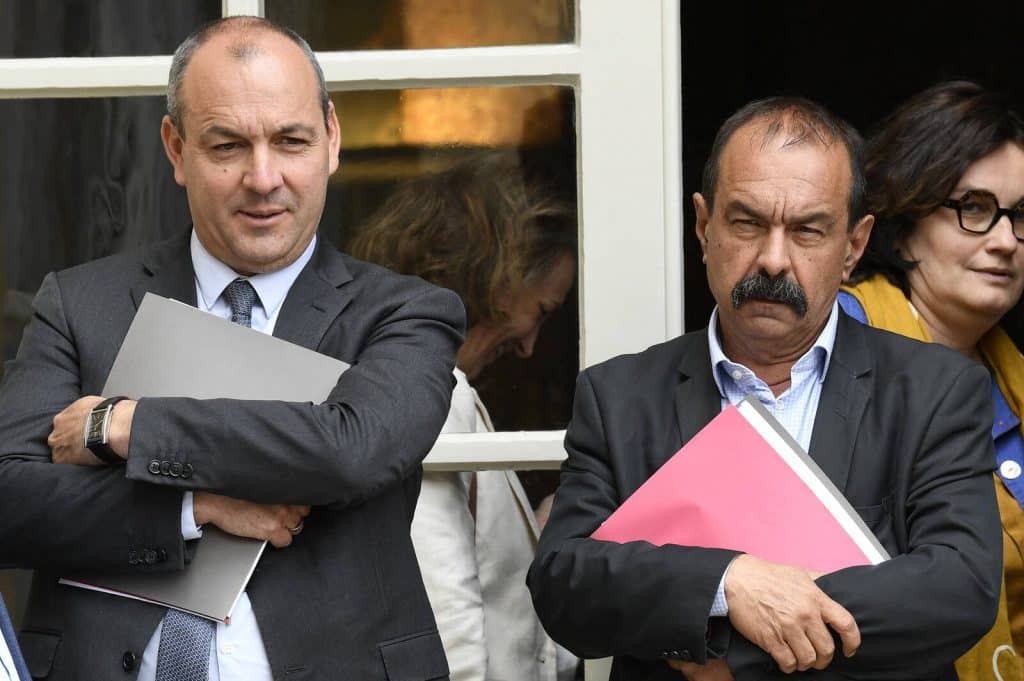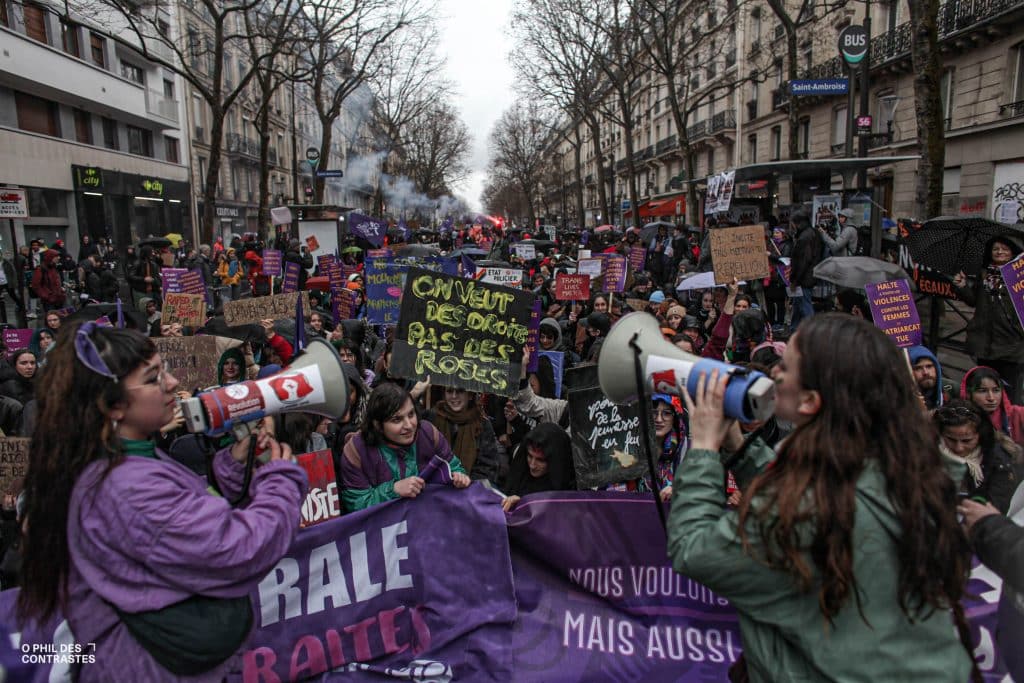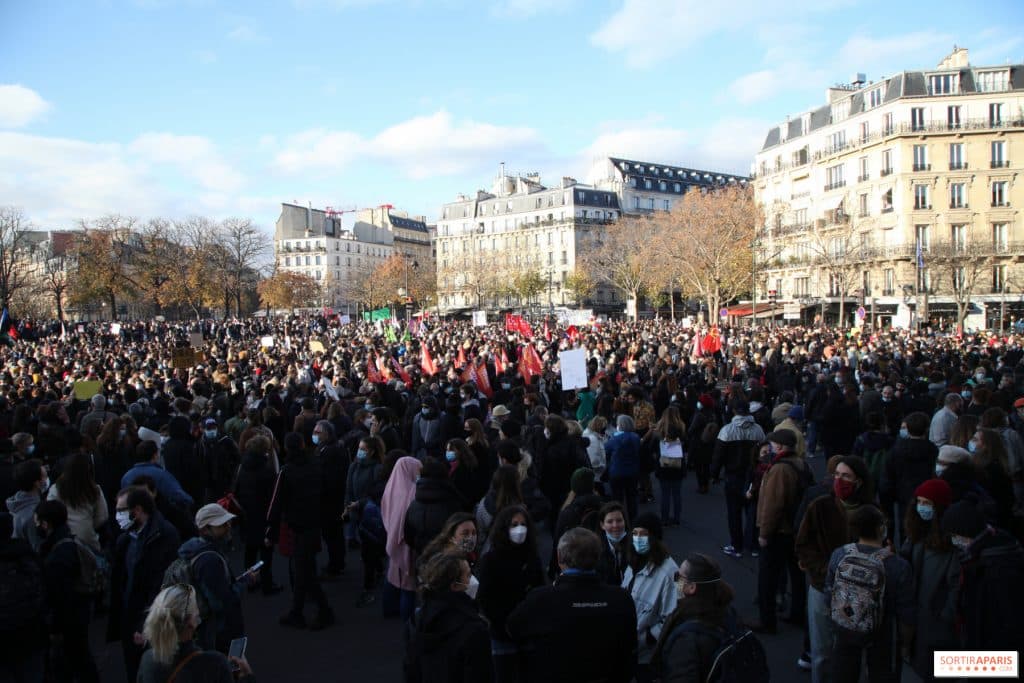After a steady drop in intensity throughout February, the sixth day of national mobilizations against Macron’s latest pension reform announced itself as a profound reinvigoration. With 700,000 in the streets of Paris and 3.5 million nationwide, according to the CGT, France’s largest union confederation, March 7 surpassed January 31 not only in terms of size, being the largest day of protest in at least 40 years, but also in terms of character. Whereas previous days had been relegated to isolated, symbolic strike actions, this, for many, marked the first day of a grève reconductible, or a “renewable” strike (that is, an ongoing, democratically decided strike, discussed and renewed actively by the workers at regular intervals on the picket lines, as opposed to limited one-day strikes, or other more passive strike strategies, usually imposed from above). The renewable strike took place in several sectors, many of them strategic. And it’s with March 8 in mind, International Women’s Day, falling conveniently the day after, that many on the ground hoped to push the movement to take up not only the withdrawal of the pension reform but also a set of urgent positive demands concerning the whole of civil society, so as to generalize the conflict by speaking to all the oppressed and exploited segments of France who are being forced to pay for the crises of the state and the bosses, most immediately the economic consequence of the capitalists’ war in Ukraine.
Yet after a historic two weeks of protest, Macron’s administration has pushed through their reform by using an antidemocratic parliamentary article in the Fifth Republic’s constitution called the “49-3” that allows the executive to bypass a vote in the National Assembly. This comes as a widely unpopular move with over 80 percent of the people of France opposing, including nearly half of supporters of Macron’s Renaissance party, and over 70 percent now calling for the government’s resignation. Here we will recount the notable mobilizations that led up to this moment, and look at where the French working class may go next.

A Intransigent Constant: The Union Coalition
The strategic turn towards renewable strikes starting on March 7 is largely the result of organic pressure from below, given that 65 percent of the French population supports an open-ended strike against the pension reform. The inter-union coalition, however, has maintained a firm hand on the movement. It imposed a pause in strike activity during the February vacation period, and has maintained its conciliatory stance toward the government, as well as its refusal to extend its demands beyond repealing the pension reform. This is beginning to reveal the contradictions of the current situation. Philippe Martinez, general secretary of the CGT, supported the call of certain unions to renew the strike beyond the national mobilization dates (in a highly equivocal manner), yet he did nothing to support them on the ground, maintaining the unity of the conservative union coalition, with Laurent Berger, secretary general of the CFDT, holding fast to his opposition to any generalized strike that would meaningfully bring the economy to a halt.
A letter by the union coalition addressed to Macron on March 9 asked him to meet with the union leaders, in order to settle things behind closed doors at the Elysée Palace, despite the huge on-the-ground mobilizations supporting a more offensive strategy, such as calling for a general strike, which is very much in the coalition’s power. The wording of this letter also voices the union bureaucrats’ fears that the situation may turn “explosive” if Macron fails to negotiate with them, perfectly portraying their misgivings at a radicalization and generalization of the movement that would take the reins out of their hands and into those of the workers themselves, while simultaneously showing the need to push things in that direction (the government having since refused to negotiate).
These explosive elements are very much in the air, ready to take flame. There remains widespread opposition to the reform and the Macron administration in general, as well as support for the mobilizations. A study published in Le Monde finds that those in precarious private-sector subcontractor jobs are just as much involved in the mobilizations as their salaried counterparts (at nearly 15 percent, a virtually unprecedented rate), and that there remains an untapped 15 percent of active workers who have not yet participated in mobilizations yet say they are “ready to do so,” with youth and especially impoverished precarious workers overrepresenting this reserve. The union coalition refuses to address these segments of society who are concerned not only by the reform but also more immediately by the rising cost of living due to inflation and stagnant pay, which is fueling much of the mass discontent with the French government.
Were this movement to take up the demand of a universal retirement age at 60 (and 55 for physically demanding jobs), as well as indexing salaries to inflation, calling for the generalization of the strikes to be taken up on the ground by all sectors, it would definitively be setting alight these “explosive” segments. Yet if the fight remains in the unions’ hands and the contradictions don’t blow up in their faces, the strikes on the ground may fizzle out and the threat of a mass disillusion from actions and protests could take hold, laying the groundwork for further antisocial reforms to more easily pass through and a resurgence of the Far Right as the alternative to the status quo. For a more thorough discussion of the strategic impasse and the movement’s potential, have a look at this discussion by Juan Chingo and Romaric Godin.
March 7: The Workers Dig In
For now, the strikes are holding. Several key sectors, from electric to oil to the ports to transport to sanitation, called for renewable strikes on March 7, to be discussed and renewed at least for March 8 in solidarity with International Women’s Day. Some went further, announcing a two-day strike, to be renewed if necessary, such as the oil depots and refineries of Le Havre, Donges, and Normandy, with many other sites renewing every eight hours. March 7 saw some impressive strike numbers, even if not all sectors went on to renew their mobilizations. One sector that saw a surge in strike participation was public service workers, back up to the levels seen on January 19, the first day of mobilizations. Private-sector workers (who are often slower to go on strike due to higher work instability) were back up to their levels at the previous height of the strikes on January 31, with many even announcing strikes beyond March 7, such as meat-processing workers, who called a week-long strike.
In transport, the workers at the state railway company, SNCF, were on the offensive, and in the subways the workers of the Paris public transport system RATP made sure that only one out of six trains was running. Both workplaces went into open-ended strikes. Starting early in the morning, major roadways were blocked in many commercial and industrial areas throughout France in impressive collective inter-professional actions. In aviation, 20 to 30 percent of flights were down, with 50 percent of plane refuellers on strike nationally, and 100 percent of airport workers on strike in Marseille, Tarbes, and Strasbourg. At Charles de Gaulle Airport, there was a massive picket of nearly 1,000 crowded outside the terminals, with speeches highlighting the highly political nature of this fight, with anti-racist and feminist speeches coming not only from activists and students but also from many of the workers. Energy workers jumped back into the struggle in huge numbers, with 80 percent or more on strike in numerous worksites. By noon, the EDF declared a loss in the nuclear sector of 9,900 megawatts of power, equal to the power of a dozen reactors, and 7,000 megawatts in hydroelectric; a full 21,000 total by day’s end was boasted by the CGT energy union. Given these actions and the millions in the streets by afternoon, March 7 was a stunning show of force.

March 8: Bread, But Roses Too
The inherent link between women’s oppression and labor exploitation was impossible to ignore this year, with many seeing March 8 as a natural continuation of the fight against a pension reform already seen as a deepening of the inequalities between men and women workers. The morning saw the pickets of those who had called for renewable strikes the day before, in the refineries, in sanitation, etc. Numerous ports were blocked by the dockworkers, with workers in other sectors joining from energy, rail, and aeronautics. Trash pickup was largely on hold in Paris, Ivry, Moselle, and Sète. Electrical workers pursued numerous “Robin Hood” actions, turning off the electricity at an Amazon distribution center, Blagnac airport, the Stade de France, and the Minister of Labor and Employment Olivier Dussopt’s home. A highway blockade and consumer solidarity action making the tolls free was violently repressed by riot police, who similarly reacted at many of the other blockages throughout the country by workers. Even workers at the Louvre staged demonstrations with evocative images of pickets in front of the Mona Lisa and Winged Victory.
After the pickets, there was a pointedly political air in the streets, with the reform fight very much on people’s minds, pushing a record-breaking number of people, from feminists to trade unionists to students, onto the pavement. Marches in Paris were lively with flash mob actions such as the one introduced by actress and activist Adèle Haenel, known for her roles in Portrait of a Lady on Fire and 120 Beats per Minute, who dedicated the performance to the women of Iran, before going on to join a contingent of nearly 1,000 from the revolutionary feminist collective Du Pain et Des Roses, a sea of purple flags engulfing the boulevards. Equally impressive marches were well on display throughout France. And everywhere there was solid union turnout, showing the worker solidarity that should underlie all struggles against oppression.
March 9: Students Strike Back
Students had already been steadily multiplying in the streets throughout the mobilization dates, and their participation since February 7 was nothing short of spectacular, with 300 high schools and 22 universities blockaded by students throughout the country. But students have been organizing their own protests beyond the union calendar since the beginning, and February 9 was their day of the week to shine, with thousands flooding the upper-class 10th district of Paris, and thousands more marching throughout France. Starting early in the morning, numerous high schools and universities were blockaded, with students choosing to show their support for the striking workers, who visited from nearby workplaces such as the refineries, incinerators, metros, and train stations. Given the precarity that students are facing with inflation, deteriorating working conditions, and appalling living standards; the recent cuts to student benefits such as for food and housing; and Macron’s recent proposal to impose a two-week military training program on all students to bolster “patriotic values” during a period of mass discontent and mobilization — given all this, the students are rightfully mad and could prove a radicalizing force that could politicize the movement by pushing forcefully for more than the demands and tactics proposed and held in place by the union heads. Since March 9, student support for and links with striking workers has only grown and deepened, whether on the ground or in the general assemblies.

March 13: One Week On
One-third of the natural gas terminals have been on hold for over a week now. Lines of cars are amassing at the slowly emptying gas stations. Major industrial and commercial zones remain blockaded nationally. On March 13, oil, electric, and rail workers were holding strong, with several sites voting to renew their strikes all the way out to March 16. Walking through Paris, one saw mountains of garbage dotting the streets in even the wealthiest and most touristy neighborhoods, an impressive sign of the importance of the sanitation workers, 40 percent of whom have been on strike for over two weeks now nationally. The three major Parisian incinerators have been blockaded, thousands of tons of trash going uncollected per day, and the strike renewed for another week, despite government threats of imprisonment for strikers who refuse to go back to work (in classic fashion, Berger, the above-mentioned head of France’s most conservative union, the CFDT, distanced himself from any such actions). This tactic of “réquisition” (forcing strategic-sector workers to go back on the job or face prison time) called against sanitation workers was used against the refinery workers during their historic strike in November, and the minister of transport this week has also responded with threats of arrest for any strikers in the refineries this time around. This is, however, a risky move that largely blew up in the government’s face in terms of public opinion in November — the strikers won much sympathy when people saw the repression they were facing.
Monday evening saw a meeting called by the Réseau de la Grève Général (Network for the General Strike), an initiative largely put in place by militants at Left Voice’s sister organization, Révolution Permanente. This meeting brought together over 600 trade unionists, students, and antiracist and feminist activists, with 700 tuning in via livestream. At this meeting, Frédéric Lordon, French philosopher and economist at the French National Center for Scientific Research, noted that “domination often compels in the dominated an underestimation of the fragility of the opponent they are facing.” Indeed, when one finds oneself at war, and this is a class war, one must never make the mistake of overestimating one’s enemy. These kinds of threats and the police repression seen at the protests and blockades, as well as the visibility of the collective force of the working class, which is entering a period of subjectivity unseen in decades, should illustrate the comparative weakness of the Macron government, which is having to negotiate deeply unpopular reforms in a losing parliamentary alliance in order to manage French capital.

March 16: Tick … Tick … Boom?
Following major actions by millions of students and workers on nearly every day since March 7, this Thursday, March 16, Macron pushed the pension reform through the French National Assembly. His Renaissance party, having failed to secure a majority in the last election and finding difficulties in retaining a bloc with their closest allies, Les Républicains, resorted to utilizing an antidemocratic parliamentary maneuver known as the “49-3” to get it done. The use of this constitutional article was an inciting factor in generalizing the mass discontent before the Yellow Vest movement in 2018, which often underlined the undemocratic nature of the French Fifth Republic, and we’re already witnessing a similarly massive and spontaneous backlash today. Thursday evening saw mobilizations of thousands in nearly every major city immediately following the passing of the reform. A demonstration at the prefecture in Marseille erupted into a wildcat protest. An inter-university march in Paris joined thousands of workers at the Place de la Concorde who then battled against shields, batons, and tear gas by pulling bags out from the thousands of tons of uncollected trash and throwing them at the riot police. And numerous other unofficial protests took place in Grenoble, Lyon, Strasbourg, etc, with chants and slogans calling for the resignation of the Macron administration (a call which is resonating, as noted above, with over 70 percent of the population). The use of the 49-3 reveals a profound political crisis in the Macron regime as it has convinced neither the French population nor even the parliament. The strategic response to such a move will prove decisive. Time is of the essence.
We know well the positions of the leaders of the union coalition, who are revealing their colors as bureaucrats through-and-through, with their sole proposal moving forward being yet another symbolic single-day action to be held next week, on March 23, allowing the immediate outrage against the government to dissipate. Even before the 49-3, Berger was already saying publicly that if the reform were to win a majority in parliament, the CFDT would fully accept the result. Martinez to his credit had vaguely alluded to further actions on the part of the CGT and called for a popular referendum to be held… the day before the National Assembly vote, on March 15 [excuse this writer’s exasperated tone]. Their incapacity to offer anything new may begin a process of large-scale recognition of their utter strategic failure. None of the protests Thursday night were called by any of the movement’s leaders. They instead reveal an energy and initiative surpassing anything Berger or Martinez has yet to offer.
But the groundwork that goes into winning a struggle such as this goes beyond anything even the most well-intentioned union bureaucrat can accomplish, and that’s the patient work being done in the increasing number of general assemblies and picket lines, where workers are discussing among themselves how to bring their colleagues into the fight, how to bring in the unorganized or unengaged sectors, of whether to renew the strikes, of what demands the movement should be taking up, of the inherently political nature of this fight, etc. The question of salaries, for example, remains central to this struggle even if the union bureaucracy, the bourgeois media, and the Macron government are refusing any connection between the two.
The meeting held by the Réseau on the evening of March 13, and now the thousands taking to the streets of their own accord, beyond the union’s calls, loudly affirms two things: First, there is a willingness to extend the strikes, to bring the economy, and therefore capital, to its knees, to generalize the massive energy expressed by millions of people in France. By nightfall, workers at Total Normandie, the largest refinery in the country, producing a quarter of all French oil, voted to halt all operations by the weekend. These refineries cannot simply be turned back on; once they’re stopped, it could take days or weeks to get production back up to capacity. Such actions will ripple out to the gas stations by month’s end, likely pushing other sectors to join in, and it is up to students and other workers to come to their aid when the government and the bosses inevitably fight back.
Second, something must be done to break the strategic impasse brought about by the union coalition and the failed “guerrilla” parliamentary strategy of the institutional Left, led by La France Insoumise. Many of those on the ground recognize this impasse, and there is a readiness to build something from below, in the unions, in the streets, and in mass general assemblies led by workers, students, the precarious and oppressed.
The current movement proves the political weakness of its adversaries. The French workers are not alone; this is, of course, happening in tandem with the massive strikes we’re seeing against the decay of the neoliberal period internationally (whether in Brazil, Peru, Britain, Germany, Portugal, Greece, etc.). A victory in France would ignite the hopes and imaginations of the working class the world over. It is imperative to make use of and build upon the current rapport of force, which remains in our favor, to go on the offensive, to take advantage of the widespread rage of the moment by posing the question of abolishing the presidency and the senate — in short, the entire edifice of the antidemocratic Fifth Republic, as the Yellow Vests did in 2018. We can draw on the entire radical history of France and the international worker’s movement to put forward a revolutionary perspective. Indeed, it is up to us all to ensure that the movement doesn’t fizzle out, but instead leads to what the union bureaucrats, the government, its police, and its media all fear: an explosion.











